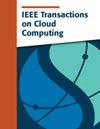Efficient Secure CNN Inference: A Multi-Server Framework Based on Conditional Separable and Homomorphic Encryption
IF 5.3
2区 计算机科学
Q1 COMPUTER SCIENCE, INFORMATION SYSTEMS
引用次数: 0
Abstract
Deep learning inference has become a fundamental component of cloud service providers, while privacy issues during services have received significant attention. Although many privacy-preserving schemes have been proposed, they require further improvement. In this article, we propose Serpens , an efficient convolutional neural network (CNN) secure inference framework to protect users’ uploaded data. We introduce a pair of novel concepts, namely separable and conditional separable, to determine whether a layer in CNNs can be computed over multiple servers or not. We demonstrate that linear layers are separable and construct factor-functions to reduce their overhead to nearly zero. For the two nonlinear layers, i.e., ReLU and max pooling, we design four secure protocols based on homomorphic encryption and random masks for two- and n-server settings. These protocols are essentially different from existing schemes, which are primarily based on garbled circuits. In addition, we extensively propose a method to split the image securely. The experimental results demonstrate that Serpens is高效安全的 CNN 推断:基于条件可分离和同态加密的多服务器框架
深度学习推理已经成为云服务提供商的基本组成部分,而服务过程中的隐私问题也受到了极大的关注。尽管已经提出了许多隐私保护方案,但它们需要进一步改进。在本文中,我们提出了一种高效的卷积神经网络(CNN)安全推理框架Serpens来保护用户上传的数据。我们引入了一对新概念,即可分和条件可分,以确定cnn中的一个层是否可以在多个服务器上计算。我们证明了线性层是可分离的,并构造了因子函数来将它们的开销降低到几乎为零。对于两个非线性层,即ReLU和max pooling,我们设计了四种基于同态加密和随机掩码的安全协议,分别用于两台和n台服务器设置。这些协议与现有的主要基于乱码电路的方案有本质上的不同。此外,我们还广泛地提出了一种安全分割图像的方法。实验结果表明,在双服务器环境下,Serpens算法的运行速度是原有方案的60倍-197倍。Serpens的优势在n服务器设置中更加显著,只比在云上执行明文推理慢不到一个数量级。
本文章由计算机程序翻译,如有差异,请以英文原文为准。
求助全文
约1分钟内获得全文
求助全文
来源期刊

IEEE Transactions on Cloud Computing
Computer Science-Software
CiteScore
9.40
自引率
6.20%
发文量
167
期刊介绍:
The IEEE Transactions on Cloud Computing (TCC) is dedicated to the multidisciplinary field of cloud computing. It is committed to the publication of articles that present innovative research ideas, application results, and case studies in cloud computing, focusing on key technical issues related to theory, algorithms, systems, applications, and performance.
 求助内容:
求助内容: 应助结果提醒方式:
应助结果提醒方式:


